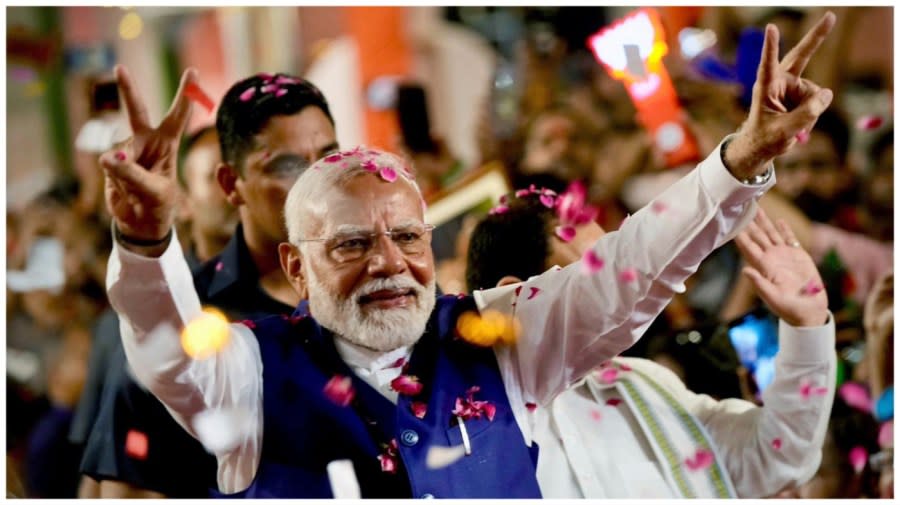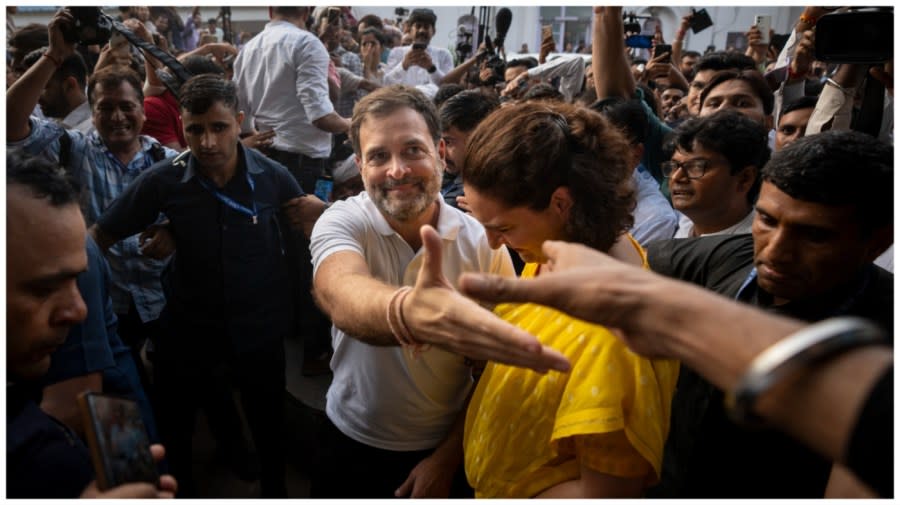India delivers shocking election result: What to know

Narendra Modi won a third term as India’s next prime minister Tuesday, however his political party won a slimmer-than-expected margin despite the polls overwhelmingly indicating a blowout.
India’s opposition, largely written off heading into the election, defied all expectations and poses a serious threat to Modi’s majority.
Modi’s Bharatiya Janata Party (BJP) and its National Democratic Alliance has yet to secure the 272 seats needed for a parliamentary majority, as it had easily won in 2014 and 2019.
“This is clearly a setback for Modi, in large part because he was expected to do so much better than he did,” said Sadanand Dhume, senior fellow at the American Enterprise Institute.
“Modi’s aura of invincibility has been severely dented.”
Here’s what to know.
Modi’s majority to shrink after surprise results
While Modi and the BJP are claiming victory, the results will sting, having come well short of the projected landslide. The biggest setback for Modi’s party came from three states that send the highest number of members to India’s lower house, or Lok Sabha — Uttar Pradesh, Maharashtra and West Bengal.
While counting is still underway in India, as of Tuesday morning the initial numbers suggest that the BJP party has fallen short of the 272 seats needed for a majority on its own and will need members of its alliance to form a government.
The main opposition Indian National Congress, or Congress Party, is projected to more than double its 2019 tally, with around 100 seats on its own and 230 for its opposition bloc.
Despite results still trickling in, Modi addressed his supporters Tuesday declaring the results “a very big win.”
“I will say to every voter of the country on this moment of victory, I want to bow down and salute them,” Modi said in New Delhi.
According to Rohan Mukherjee, an assistant professor of international relations at the London School of Economics, if current projections hold, Modi’s BJP will need to change its approach.
“Modi will have to govern more cautiously as there will be parties in his coalition with the power to undermine his government’s initiatives,” Mukherjee added.
Before Modi’s meteoric and overwhelming rise to power in 2014, this was often the case in past coalition governments.
And it stands in stark contrast to predictions ahead of the election that Modi would use a massive mandate at the ballot box to push ahead with divisive reforms.
“This rests speculation that he could embark upon a dramatic agenda on things like constitutional amendment, that’s just not going to be possible,” Dhume said of Modi’s shrinking majority.
“It’s going to be, have to be much more negotiated, much more of the kind of governance that you would normally see in a highly contested parliamentary democracy.”
How did Modi lose his mojo?
According to Dhume, Modi’s shrinking majority could be attributed to a complex mix of politics, economic dissatisfaction and concerns about democracy.
“Some of this is truly befuddling, because he did pretty badly in Uttar Pradesh. He swept Madhya Pradesh next door. So it’s a whole bunch of causes, and you also have to factor in the fact that despite all this hype, it’s very, very difficult to win three terms in a row in India,” he said.
The last time a political party won a third term in India was in 1962 with Congress and India’s first prime minister, Jawaharlal Nehru.
In April, Modi was accused of using hate speech after he called Muslims “infiltrators” — some of his most incendiary rhetoric about the minority faith.
Critics of the prime minister — an avowed Hindu nationalist — say India’s tradition of diversity and secularism has come under attack since his BJP won power a decade ago.
They accuse the party of fostering religious intolerance and sometimes even violence. The party denies the accusation and says its policies benefit all Indians.
According to Deepa M. Ollapally, research professor of International Affairs at George Washington University, “Modi and by extension, the BJP have been weakened, maybe even humbled.”
Ollapally added that the challenge they faced in their traditional Hindi heartland stronghold is a “sobering wake up call that jobs, economic relief and social justice are more important than religious sentiment or international prestige.”
Opposition leader says voters sent a clear message

Rahul Gandhi, the scion of India’s powerful political dynasty, the Nehru-Gandhi family, hailed the election results as a win for democracy in India.
“The main thing that this election has said, the country has clearly and unanimously stated: We do not want Narendra Modi and Amit Shah to be involved in running of this country. We do not like the way they have run this country. We do not appreciate the way they have attacked the Constitution. That is a huge message to Narendra Modi,” Gandhi said at a party press conference.
Shah is Modi’s powerful minister of home affairs and right-hand man.
Gandhi’s father, grandmother and great-grandfather were all previous prime ministers of India.
What this means for India-US relations
Despite the unexpected drama, Modi will remain in the top job, and there is unlikely to be significant change in relations with the U.S.
“It was coalition governments that developed the strong foundations for cooperation with Washington in the first place,” Mukherjee said to The Hill.
“While the cost of foreign policy initiatives may be higher now for Modi in terms of keeping his ruling coalition together, the BJP is still a dominant party and there is a political and economic logic to U.S.-India relations that will keep things ticking along,” he added.
“Shared concerns about China’s strategic challenge will keep India and U.S. closely aligned, no matter the political equation,” Ollapally said.
However, according to Mukherjee, if there is change, it will be due to differences in national interests and not Modi’s diminished mandate.
“If anything, the result is an affirmation of Indian democracy, which should also assuage some India skeptics in Washington,” he added.
The Associated Press contributed.
Updated: 2:38 p.m.
Copyright 2024 Nexstar Media, Inc. All rights reserved. This material may not be published, broadcast, rewritten, or redistributed.
For the latest news, weather, sports, and streaming video, head to The Hill.


